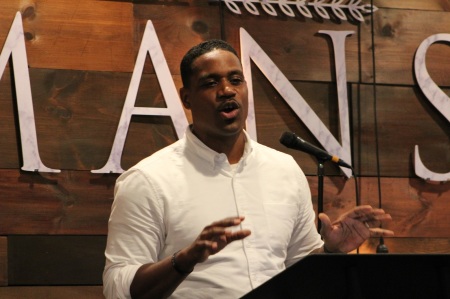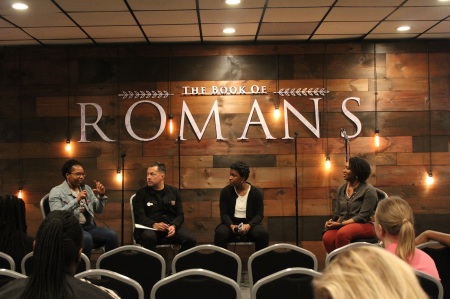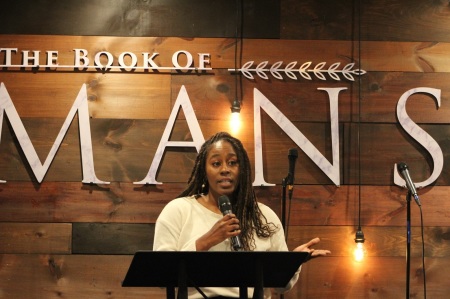Will Democrat and Republican evangelicals put Gospel before party for 2020 election?

NEW YORK — It’s Friday night in Bedford Stuyvesant, Brooklyn, and about 50 people are quietly listening to Justin Giboney talk about his big idea for evangelical Christians.
“What’s needed today, we really believe … is nothing less than a paradigm shift. A completely different way of perceiving and engaging politics,” Giboney, an attorney and political strategist from Atlanta said to the diverse group of Democrats and Republicans.
Through a growing coalition called the AND Campaign, already operating in several major cities like Chicago and Atlanta, the strategist, who is also president and co-founder of the initiative, believes he and his team can convince evangelicals in cities across America to unite and vote “the right way” come 2020 regardless of the party they support.
And “the right way” for evangelicals to vote, he argues, is with the principles of their faith dictating the way they engage with politics.
“We stand first for the proposition that faith must be at the center of Christian civic engagement. And that we must ultimately transcend partisanship and political ideology. Those things may be helpful tools but they can never be the masters of our social action,” Giboney said as his audience listened politely with a few heads sometimes nodding in agreement.
His message sounded at times like a pastor and at others a professor of history and theology as he argued how Christian luminaries like Fannie Lou Hamer, Dorothy Day, and Frederick Douglas worked with political parties without sacrificing their Christian ideals.

“… These folks, while they were willing to partner with, and work within political parties and secular tribes, they weren’t defined by them, that’s not where they found their identity. Their public witness wasn’t limited to these worldly theories and philosophers. It transcended those things,” he said.
“The truth is, if they would have allowed themselves to be limited by partisanship and secular ideology, they would have never really served their purpose. Maybe never even been worth claiming. But their witness was bigger than those things because they weren’t seeking validation or affirmation from the world,” he argued.
“We have to be able to partner with others and wrestle with theory without being converted because cultural and political ideologies proselytize. ... They seek to convert us to their beliefs by nature. That’s what ideas, ideologies do. They seek to convert you. Can we wrestle with those things without being converted? Can we take what’s good from those things without being converted?” Giboney asked.
The Atlanta attorney admits that he is making a big ask of evangelicals already entrenched in the framework of the Democrat and Republican parties but believes the request is necessary.
In the two and a half years since he co-founded AND Campaign with recording artist Sho Baraka and Angel Maldonado, lead pastor of The Path Church in Atlanta, Giboney says he has already seen signs that the grassroots activism he is advocating among urban evangelical Christians can be effective while preserving the freedom of Christian principles.
The debate
The debate on evangelicals engaging politically through the framework of their faith isn’t new. In fact, before he was elected president, Donald Trump’s candidacy created a divide between evangelicals who wanted to win and those who were concerned about his fidelity to Christian ideals and what supporting candidate Trump would say about their faith.
“Trump is a misogynist and philanderer. He demeans women and minorities. His preferred forms of communication are insults, obscenities and untruths. While Christians have been guilty of all of these, we, unlike Trump, acknowledge our sins, ask for forgiveness and seek restitution with the aid of the Holy Spirit and our community of believers,” The Christian Post’s editors warned in 2016 among a chorus of evangelicals who echoed similar concerns.
Pastor Robert Jeffress, leader of the influential 12,000-member First Baptist Church in Dallas, Texas, dismissed Republicans who refused to support Trump’s candidacy however as "fools."
He told CP in an interview that year, that while the Bible does not specifically address how Christians should vote, Christians should apply both faith and reason in voting.
"If the Bible gave a checklist for how to choose a candidate, how to vote for a candidate, it would be a simple matter but the Bible provides no such checklist because voting didn't exist when the Bible was written," he said.
"You didn't get to vote for kings or for emperors. And I believe there are a lot of criteria that ought to be used in selecting a candidate. His faith is one issue, his character, his leadership ability, his electability are all legitimate criteria to use in selecting a candidate," Jeffress explained at the time.
Evangelicals were encouraged, as Giboney is asking now, to vote according to their faith. The results of that appeal in the 2016 general election, however, yielded a sharp disparity between white and minority evangelical voters.
White evangelical voters united to vote in high numbers for Trump, 80-16 percent, according to exit poll results. It was the most they had voted for a Republican presidential candidate since 2004, when they backed President George W. Bush by a margin of 78-21 percent.

For evangelicals of color however, the picture looked quite different. Only 7 percent of black born-again Christians voted for Trump in 2016. Some 31 percent of the Hispanic vote went to Trump, while only 37 percent of Asian American born-again or evangelical Protestants gave him their vote.
Many voters from both camps presented arguments that they were voting for the lesser of two evils. While black and white evangelicals have very little disagreement about God, the groups disagree sharply over race and social justice.
Social justice
On Friday night, as Giboney and his team launched the New York City chapter of AND Campaign, they pointed to initiatives that will increase awareness of the cash bail system and help push for reform, encourage civic engagement on issues affecting Christians in the city, and provide diverse biblical perspectives on social issues and messaging through digital media platforms.
“We believe that at certain times and on certain issues, Christian principles compel us to defy both political conservatism, and political progressivism. When conservatism means preserving unjust systems and institutions then it must be opposed. When progressivism means moving further and further away from God’s truth, it too must be opposed. Because when it comes to political ideology … to be conservative or to be progressive at all times on every single issue, is not only intellectually lazy, and easily manipulated, we would argue that it’s not faithful,” the Atlanta attorney said.
Giboney believes that the “right way” for Christian voters to engage politics is to vote in line with biblical principles they profess and not in lockstep with the agenda of their political party, or separate their faith convictions from the social issues they care about.
He argues that he is not asking Christians to abandon their political parties but urges them to hold political leaders accountable on issues such as social justice or abortion and not be afraid to vote against agendas that do not align with their values.
While some white evangelicals see social justice as a threat to the Gospel, Giboney’s team described it as “how we express love for our neighbor.”
He is fully aware that what he is asking of individual believers might seem like a daunting and futile effort, but he believes collectively, Christians can advocate together for more than just the issues. They can advocate for biblical values that benefit the common good such as taking a stand against abortion among Democrats or standing against policies that harm minorities among Republicans.
“As an individual that’s very hard. I can move around and whatever, how effective is that? That’s the point of the AND Campaign. You do it as a coalition,” Giboney told CP after his presentation. “Our framework is this – social justice and moral order. In our politics now, it’s separate. When you talk about social justice now that’s Democrats. When you talk about moral order that’s Republicans. We’re saying ‘no.’ The Gospel is both so we have to be both. So that’s the framework. So it’s love and truth, compassion and conviction framework.”
And that framework, Giboney says is biblical.
“You don’t define your politics by your opposition. Regardless of what white folks and Republicans are doing or these folks over here are doing I have to do what’s right. So I think where we get caught up is, the framework comes from the parties, the framework comes from the ideology, we’re saying the framework should come from the Bible,” he said.
“I talk a lot about identity. If my identity is with progressives then I’m not gonna vote the right way when it comes to abortion because I’m too stuck on what my identity is there. We advocate to be in a party but my identity is not in the party. Once I have a separate identity, I still can go against that party,” he said.
The night also featured a panel discussion with professionals involved in social justice work. They were Nena Ruth Ugwuomo, founder and president of Student Dream, a non-profit that trains urban kids to build wealth; Pastor Zac Martin, executive director of Trellis, another nonprofit that helps build neighborhood collaborations to address injustice; and Yolanda Solomon, a ministry fellow for Christian Union at Columbia University.





















